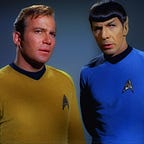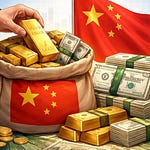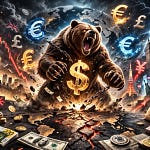Everyone should love Star Trek. It imagines a world without money, where all the different nations of the world work as one. Its continuing mission: to explore strange new worlds; to seek out new life and new civilizations; to boldly go where no one has gone before! But away from the science and the fiction, it was the first American TV show to broadcast an interracial kiss in 1968. Star Trek is progressive to a fault, while Dune is desperately realpolitik.
To my mind, Star Trek follows up on the ideas I expounded in my post on Empire and Politics. In this post, I used John Darwin theory of Empire to delineate three historic empires, a Christian, Muslim and Confucian empires, centred on Europe, Middle East and East Asia respectively. What Darwin’s analysis does it greatly simplify power structures and history. It also solves the conundrum of why does religion, which promotes peace and goodwill, always seem to end up in the middle of all the most intractable conflicts. Simply put, religion is a power structure, more than a belief system.
As he notes, even though Europe was constantly at war, the main nations were also constantly swapping information, technology and culture. European wars were for control of Europe - not to destroy it. I like to think of World War I as a fight between France and Germany for control of Europe, World War II as a fight between Britain and Germany for control of Europe, and the Cold War as a fight between USSR and USA for the control of Europe. Note if you use religion as a way to delineate empire - Europe includes both North and South America as well as Australasia.
In Star Trek terminology, “Europe” is the Federation, slowly but surely adding civilisations to single polity - while maintaining their own cultural identity. Continuing this analogy, then we can see the Russians as Klingons. War like, and enemies for long time, but potential and eventual members of the Federation.
While I doubt US politicians think in these terms, Republicans and Democrats are united in their fear of China, not Russia. And the reason for this is that China operates completely outside of any European empire. I also wonder if this logic still applies to Japan. The nuclear submarine deal that underpins AUKUS deal, would make more sense including Japan in my view, and yet Australia was chosen rather than Japan.
If Russians are Klingons, then what are the Chinese? The best approximation I can come up with is that they are the Borg. I am only became familiar with the Borg because my Trekkie housemate was watching Star Trek Voyager, and the character “Seven of Nine” played by Jeri Ryan made an appearance. My interest was piqued.
Borg, if you are unfamiliar, are enemies of an Earth-based Federation, whose only real interest is the assimilation of other species’ technologies and DNA to improve themselves. Their catchphrase, “resistance is futile”, has entered the popular lexicon. To anyone who has spent time in China or Japan, European ideas being assimilated and made local is very common theme. Japanese curry rice is by definition assimilated and definitely Japanese. And Chinese history, unlike that of Russia, is not of empire expansion through war, but through assimilation. As far as I know, the Federation and the Borg never reached a truce or an alliance, as their value systems are too much at odds. Also in the Star Trek Borg tradition, the US is desperately trying to slow the technology that can be assimilated. But can China/Borg be stopped? Well using the International Innovation Index, China already seems to be one of the most advanced nations in the world.
So will China turn Klingon on Taiwan and invade? Unlikely I think. More likely, China will wait for either the West or other nations to build out alternative supplies of advanced semiconductors. Once this happens, Taiwan loses any strategic importance, and will slow become assimilated. Hong Kong and Macau have both already been assimilated, Taiwan will likely follow - but maybe on a 30 year timeline.
The problem, as I outlined before is that to keep Chinese GDP below the US level implies US policy is aiming to keep Chinese relatively poor. This is a tough policy to push to Chinese trade partners, and like Russian sanctions, it incentivises nations to work around the US system. To quote Data - this is not logical. I suspect efforts to hold back China not to work. I suspect Borg-like assimilation to continue. Resistance is futile.















